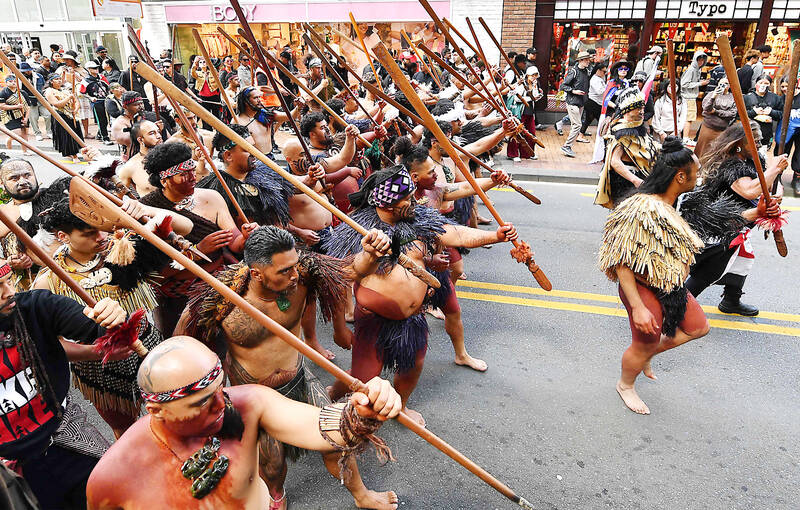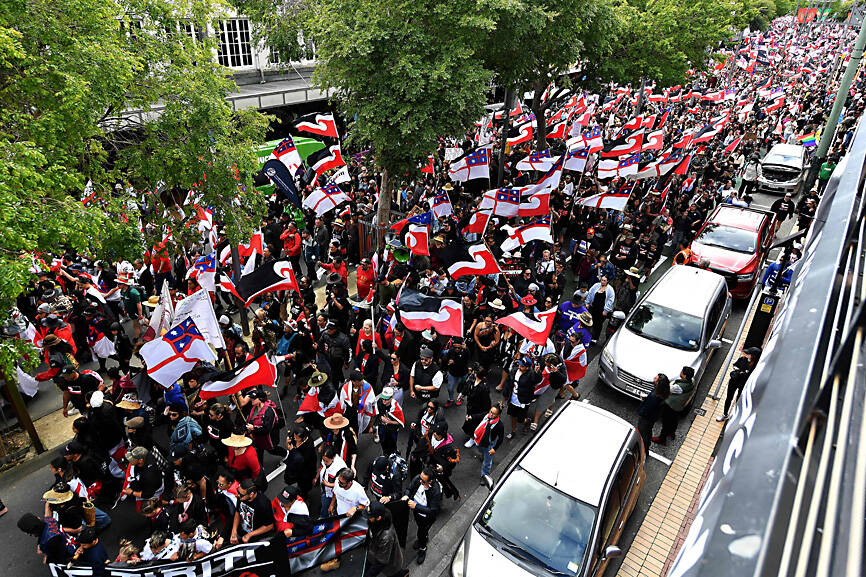Booming indigenous Maori “haka” chants yesterday rang out across New Zealand’s capital, as tens of thousands rallied against a conservative push to redefine the nation’s founding treaty.
More than 35,000 demonstrators poured into the harborside city of Wellington, police said, shutting down busy streets as their spirited procession inched its way toward parliament.
Bare-chested men draped in traditional feather cloaks were joined by horse riders waving the red, white and black Maori flag. Children marched alongside adults bearing distinctive full-face Maori moko tattoos and clutching ceremonial wooden weapons.

Photo: AFP
Protests have been swelling throughout New Zealand after a minor party in the conservative coalition government drafted a bill to redefine the 1840 Treaty of Waitangi. Although the bill has almost no chance of passing, its mere introduction has triggered one of the largest protests in the nation in decades.
After it was presented for debate in parliament last week, 22-year-old Maori Party MP Hana-Rawhiti Maipi-Clarke took to her feet in the chamber, ripped the bill in half and launched into a haka. She joined the crowds of protesters gathered on the lawns yesterday outside New Zealand’s beehive-shaped parliament building.
“I may have been suspended for 24 hours and not let into the gates of the debating chambers, but the next day I showed up outside the steps with a hundred thousand of my people, marching with our heads held high and our flags waving with pride,” she told them.

Photo: AFP
“We are the king makers, we are the sovereign people of this land and the world is watching us here,” she said.
Many critics of the bill — including some of New Zealand’s most respected lawyers — see it as an attempt to strip long-agreed rights from the nation’s 900,000 strong Maori population.
“It’s not the best way to have a conversation. We will not accept unilateral change to a treaty that involves two parties,” said Ngira Simmonds, a key adviser to New Zealand’s Maori queen.
“There is a better way,” he said.
Many demonstrators arrived in Wellington after a nine-day hikoi (protest march) that began hundreds of kilometers away at New Zealand’s northern tip.
At the center of the outcry is government minister David Seymour, the outspoken leader of the libertarian ACT Party — a minor partner in the governing coalition.
Seymour has long railed against affirmative action policies designed to help Maori, who remain far more likely to die early, live in poverty or wind up in prison. His bill would look to wind back these so-called “special rights.”
New Zealand Prime Minister Christopher Luxon has voiced his opposition to Seymour’s bill, meaning it is all but doomed to fail when it comes to a parliamentary vote.
However, former conservative prime minister Jenny Shipley said just putting it forward threatened to “divide New Zealand in a way that I haven’t lived through in my adult life.”
Seen as the nation’s founding document, the Treaty of Waitangi was signed in 1840 to bring peace between 540 Maori chiefs and colonizing British forces. Its principles today underpin efforts to foster partnership between indigenous and non-indigenous New Zealanders and protect the interests of the Maori community.
The anniversary of the treaty’s signing remains a national holiday.

Drug lord Jose Adolfo Macias Villamar, alias “Fito,” was Ecuador’s most-wanted fugitive before his arrest on Wednesday, more than a year after he escaped prison from where he commanded the country’s leading criminal gang. The former taxi driver turned crime boss became the prime target of law enforcement early last year after escaping from a prison in the southwestern port of Guayaquil. Ecuadoran President Daniel Noboa’s government released “wanted” posters with images of his face and offered US$1 million for information leading to his capture. In a country plagued by crime, members of Fito’s gang, Los Choneros, have responded with violence, using car

Two former Chilean ministers are among four candidates competing this weekend for the presidential nomination of the left ahead of November elections dominated by rising levels of violent crime. More than 15 million voters are eligible to choose today between former minister of labor Jeannette Jara, former minister of the interior Carolina Toha and two members of parliament, Gonzalo Winter and Jaime Mulet, to represent the left against a resurgent right. The primary is open to members of the parties within Chilean President Gabriel Boric’s ruling left-wing coalition and other voters who are not affiliated with specific parties. A recent poll by the

TENSIONS HIGH: For more than half a year, students have organized protests around the country, while the Serbian presaident said they are part of a foreign plot About 140,000 protesters rallied in Belgrade, the largest turnout over the past few months, as student-led demonstrations mount pressure on the populist government to call early elections. The rally was one of the largest in more than half a year student-led actions, which began in November last year after the roof of a train station collapsed in the northern city of Novi Sad, killing 16 people — a tragedy widely blamed on entrenched corruption. On Saturday, a sea of protesters filled Belgrade’s largest square and poured into several surrounding streets. The independent protest monitor Archive of Public Gatherings estimated the

Irish-language rap group Kneecap on Saturday gave an impassioned performance for tens of thousands of fans at the Glastonbury Festival despite criticism by British politicians and a terror charge for one of the trio. Liam Og O hAnnaidh, who performs under the stage name Mo Chara, has been charged under the UK’s Terrorism Act with supporting a proscribed organization for allegedly waving a Hezbollah flag at a concert in London in November last year. The rapper, who was charged under the anglicized version of his name, Liam O’Hanna, is on unconditional bail before a further court hearing in August. “Glastonbury,